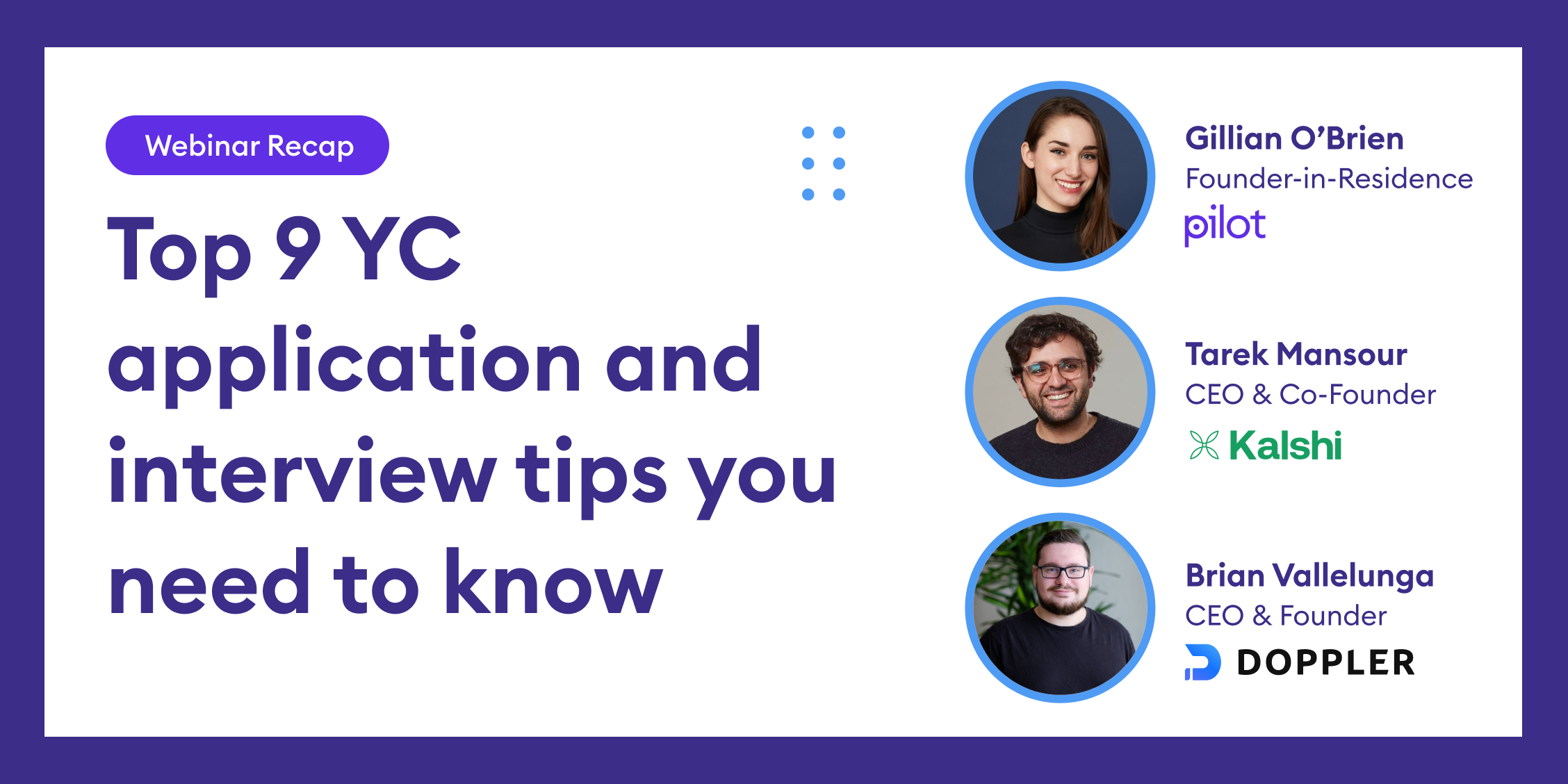Top 9 Y Combinator Application and Interview Tips You Need to Know
A confirmation email has been sent to your email.

Getting accepted into Y Combinator is a watershed moment for startup founders who want to take their talents and big ideas to the next level.
Apart from the much-needed financial boost that enables startups to hit the ground running, the mentorship and networking opportunities offered by YC can set up founders for success once their program is done.
But getting your foot in the door isn’t exactly easy, especially when you’re likely competing with hundreds of other startup founders for a coveted spot in one of YC’s biannual batches.
Filling out YC’s online application, preparing an application video, and somehow passing the in-person interview round with flying colors can be a time-consuming if not daunting experience for many early-stage founders.
To help you develop a game plan that works for your startup, we’ve compiled a list of expert advice and insights from actual founders on creating a successful Y Combinator application.
These founders — Pilot’s Founder-in-Residence Gillian O’Brien, Doppler Co-Founder and CEO Brian Vallelunga, and Kalshi Co-Founder and CEO Tarek Mansour — shared snippets of their experience in our YC admissions webinar, where they traded stories about their own applications and offered tips for anyone who’s thinking of applying.
“Just put a lot of thought into your business,” Brian said during the webinar. “Be different, be unique, and have persistence. You'll get there.”
1. Brevity is Key
Knowing the ins and outs of your business is paramount, but explaining it to someone like your life story can also work against you. In fact, extremely long-winded answers to questions on the YC application or during the in-person interview can actually do more harm than good.
“YC likes clear, concise communication,” Gillian said. “They want to see that founders have a really good grasp on what they're doing, and the best way you can demonstrate that is by saying what you need to say in as few words as possible.”
According to Brian, any response that you provide on your YC application or during an in-person interview should “really get right to the point” within the first couple of sentences.
“If they are three sentences in and still don't understand what you're doing, they’re going to move on to the next application,” he explained. “You should also avoid using generic phrases like, ‘We are a technology company that improves the world’ — I have no idea what that means.”
Since hundreds of founders are likely submitting applications for any given YC batch, there’s only a limited amount of time for you to make an impression.
“If they don't get what you do, it's going to be very difficult,” Tarek said. “You really need to put yourself in the position of someone who’s truly going to give just four seconds to your first few sentences and probably gloss over them.”
2. Embrace the Ugly Truth
It’s easy to feel like no one will want to invest their time, money, and effort into a business that isn’t gaining traction or doing well.
But let’s face the facts: you’re not where you want to be and need YC’s help to get there. You know that, and as it turns out, so does everyone else at YC.
It can be tempting to play down the hardships and challenges that your company is facing, but it’s not easy to fool application reviewers and YC partners.
“YC knows that your business is on fire, basically, and one of the first things that they say when you start the batch is, ‘We know that your business is very vulnerable,’” Gillian said. “Along with being clear and concise, I think the best thing to do is to be straightforward and honest about the situation that you’re in.”
For instance, if you’re asked to explain how long you’ve been working on your company, don’t try to overexplain by saying that you’ve had a business idea for the past three years, worked on it part time for two years, and then started working on it full time for the last two months.
In this case, it may be best to keep your response simple and say that you’ve been working on the business for the last two months.
“Be confident and straightforward,” Gillian said. “When you try to spin it or add a bunch of frills to an answer, it’s just a little bit more obvious to the person reading the application that you don't think that it's a very good answer. You're trying to say what they want to hear, which you don't need to do.”
Since each YC partner knows certain industries really well, the team as a collective whole will know when founders are onto something. As a founder, your job is to succinctly explain what isn’t working within a certain industry and convey how your business will make it better, fulfill a need, or fill a gap in services.
Fluff that doesn’t add much value and overt attempts to make your company look better than it actually is can work against you.
3. Talk About Your Competitors
There’s nothing wrong with having competitors, but when your startup is just getting off the ground, it can be tempting to avoid or dance around the topic when you’re trying to attract investors.
That’s exactly what happened when Brian and his fellow co-founders made it to the interview round with YC partners.
“They called us out for it in the interview,” he recalled. “We then gave an answer that was kind of like this, ‘We can live in the same space as our competitor, and that’s totally fine. The market is big enough to handle both of us, and maybe at some point we’ll eat up their market share.’”
Looking back on it now, Brian believes that response may have helped his team get into YC.
“It’s easy to get scared about that because they seem so big but what you have on your side is speed and mobility, which is, arguably, sometimes even more powerful,” Brian said. “If you have a unique perspective about the market and your competitor, that's really powerful. So, for example, it’s like, ‘They’re doing X, but we believe that the market actually needs Y, so we’re just different.’”
4. Know What Your X Factor Is
Whether you realize it or not, your team likely has some sort of unfair advantage — or advantages — over every other team.
The challenge, then, is to figure out what makes you — and your startup — uniquely qualified for YC. Once you’ve done that, focus on no more than two of those qualifications and drive the message home when you’re writing an application, recording an application video, or even preparing for an in-person interview.
“There's fatigue that goes on when you're reading these applications, so you want to really double down on whatever it is that you choose and re-emphasize it throughout your application,” Gillian said. “Keep coming back to the reason that you feel is going to make you win.”
As risky as it may sound, don’t be afraid to “think differently than what the market is doing today,” Brian said.
“I think that's probably one of the strongest unfair advantages you can have,” he explained. “If you think there's a competitor out there, they're not going to be able to change on a dime. They've mobilized their troops to go in a certain direction, and if you're going in a completely different direction that you think is better for the market, then that's a huge, huge advantage.”
Although it can seem like you need some kind of superpower or star power to really stand out, what makes your company and team unique may actually be quite simple.
In Kalshi’s case, for instance, Tarek and his fellow co-founders believed they cared more than anyone else in their industry and were willing to go the extra mile to make their business work.
“It could be a simple answer, but explain why as well,” Tarek said. "It doesn't need to be a superpower; there really are no superpowers. We’re all pretty normal human beings, so it could just be something very simple.”
5. Lean Into Mischievousness
While a lot of attention is paid to the companies that came out of YC, it’s worth pointing out that not all of them were conceived by founders before their batches started.
In fact, the founders of Segment (acquired by Twilio), Retool, and Brex had completely different startup ideas when they arrived at YC. With help of YC partners, these founders eventually pivoted during their batch and started the companies that we know today.
“They came in with completely different ideas, but YC wasn't betting on their idea — they were betting on the founders to get to the right idea,” Brian said.
With this in mind, it’s important to take advantage of opportunities that let YC partners see who you are as a person.
“Being a little mischievous — maybe knowing where the line is and getting close but not crossing it — and those kinds of things can highlight you as a person and some attributes they may be looking for, so go big and bold on it,” Brian said.
As an example, The Muse Co-Founder and CEO Kathryn Minshew has spoken about her interesting response to this particular question on YC’s application: “Please tell us about the time you most successfully hacked some (non-computer) system to your advantage?”
In The Muse’s YC W12 application, Minshew explained how she only paid for a hotel room once during a 77-day trip around the world and somehow talked her way onto a plane that departed 12 minutes after she arrived at the airport.
“I think YC wants to see that you’re curious and have some gumption and creativity,” Gillian said. I think that those things come out when you can show that you've hacked something, as long as it's wholesome, not actually exploiting anyone, or breaking the law.”
If you’re thinking about how your personality can shine through, consider the fact that founders shouldn’t be afraid to take risks, think outside of the box, and push the envelope a little.
You should also list all of your business ideas on that part of the YC application, since it may be an unexpected way to showcase who you are as a person.
While founders may be worried about people thinking that their business ideas aren’t good, it’s important to just take a leap of faith anyway.
“Just go all in and list them all because it’s an opportunity to show your curiosity and a little bit of your personality, too,” Gillian said.
6. Get a Recommendation From Someone You Know
Getting a recommendation from someone in the YC community can go a long way when you’re applying for a slot in a batch. Although a recommendation isn’t required or necessary to apply to YC, having one on your application is always a good idea.
The caveat, however, is that you should know someone well before asking them for a recommendation. Randomly asking for a recommendation from anyone affiliated with YC or founders from previous batches isn’t going to get you very far.
“Don't ask people who you don’t know very well or at all,” Gillian said. Ask people who you know well and can vouch for you. That's going to be very good.”
7. If You Get Rejected, Just Keep Applying
Not getting accepted into YC can be a hard pill to swallow, but doesn’t mean you should give up hope.
After all, there are two opportunities every year to apply for a slot in YC’s summer and winter batches, and a fair share of founders who got in were rejected several times before they were ultimately accepted.
In fact, applying multiple times can be a testament to your perseverance, determination, and passion.
“I don't think there are any rules around when and how to apply, and there's no internal rules at YC,” Tarek said. “They would love to see your application four or five times any time in the year.”
Brian, for instance, applied to YC six times before finally getting accepted on his seventh try.
“It took me seven times to get in, so it’s proof that you can do it,” Brian said.
8. Avoid Cliche Comparisons
During YC’s early years, one of its co-founders, Paul Graham, wrote a comprehensive guide on how to apply to YC and offered a “good trick for describing a project concisely.”
“Explain it as a variant of something the audience already knows,” he wrote. “It’s like Wikipedia but within an organization. It’s like an answering service but for email. It’s eBay for jobs. This form of description is wonderfully efficient. Don’t worry that it will make your idea seem ‘derivative.’ Some of the best ideas in history began by sticking together two existing ideas no one realized could be combined.”
The problem is that this safe, yet effective approach has likely been used by a number of YC applicants over the years.
To really stand out, applicants should be bold and original. Latching on to a movement or trend may help people understand your business, but it won’t help you break away and develop something that’s game changing.
“They're not looking for those founders who are looking for cheap, easy wins,” Brian said. “They're looking for founders who are thinking differently about a market. They're going to build something really, really big. If you think about where YC makes its money, it's on the couple companies that make it extremely big, and they did that by thinking about things very differently.”
9. Show the Scale of Your Ambition
Determining the size of your market can be particularly difficult, especially if you occupy a unique place within one or want to do something that’s very different.
In these cases, it can be more advantageous to explain where you want to be and what that will look like later on down the line.
“If you really are the breakout success that we all want you to be, you're probably going to be impacting the market,” Brian said. “The market will grow just by a function of you being in it, so I think this is an opportunity to be super transparent and just share how you think about things.”
Though figures and estimates can help you quantify the impact of your business on the market, trying to paint a vague or ambiguous picture of what that would look like won’t be helpful in an interview. Instead, it may be more helpful to think about how far you want to go and where you want to land.
“In some ways. I feel like they don't even want to know what the size of your market is,” Tarek said.” They want to know what the scale of your ambition is.”
Turn to Pilot for More Advice
A lot has been and probably will be written about Y Combinator, but the fact is that there’s no way to guarantee that you’ll secure a spot in one of their biannual batches.
At the end of the day, remember that YC partners are investing their time, money, and energy on founders just like you.
Whether you’re filling out your application, filming your application video, or even preparing for an in-person interview with YC founders, keep some best practices in mind by concisely articulating who you are, what your team is working on, and where you want to be in the future.
When the time is right, take calculated risks and let your personality shine through every now and then.
Want to get even more tips and insights on the YC application process? Check out our YC S22 admissions webinar, where Gillian, Brian, and Tarek offer their feedback on several real applications.
Learn more about how Pilot has helped YC companies on their journey.


